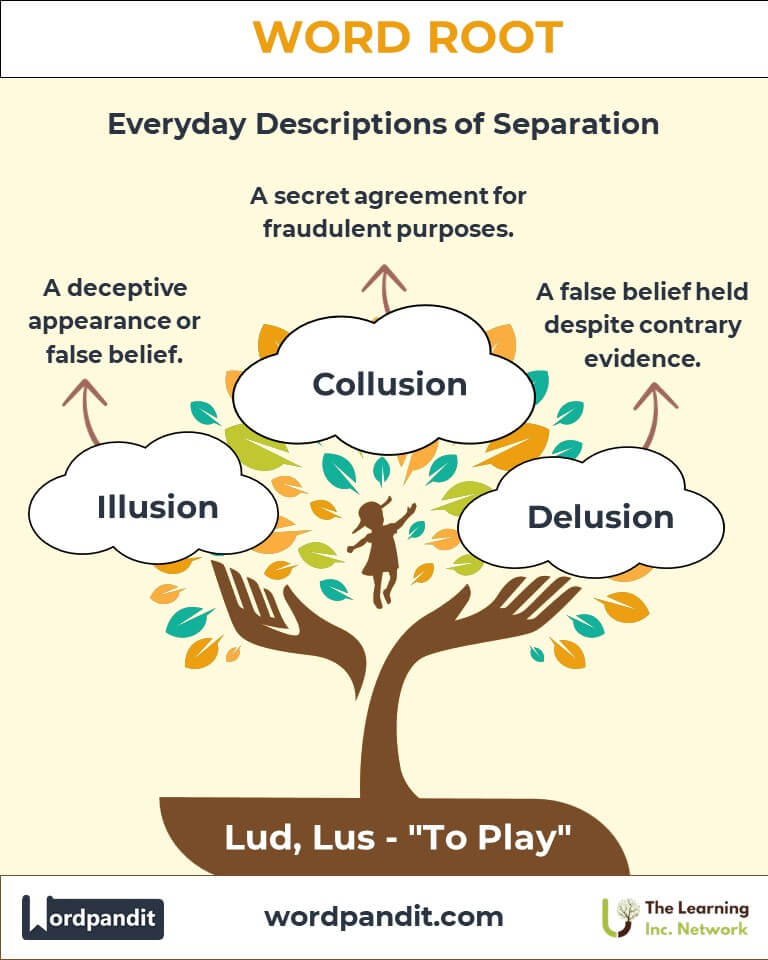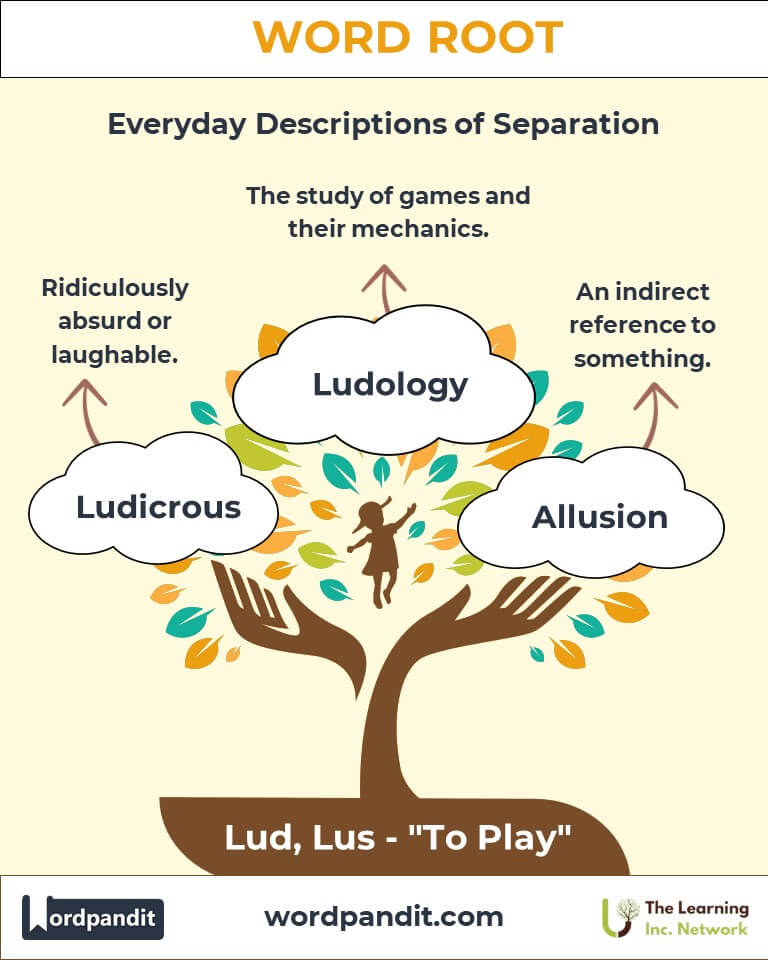Lud and Lus: The Roots of Play and Entertainment in Language
Discover the charm of the roots lud and lus, derived from the Latin word ludere, meaning "to play." These playful roots infuse words with concepts of entertainment, trickery, and illusion, appearing in terms like ludicrous (absurdly humorous) and illusion (a deceptive appearance). Join us as we explore how these roots have shaped language and culture.

Table of Contents
- Introduction: The Essence of Lud and Lus
- Etymology and Historical Journey
- Mnemonic: Unlocking the Power of Lud and Lus
- Common Lud and Lus-Related Terms
- Lud and Lus Through Time
- Lud and Lus in Specialized Fields
- Illustrative Story: Lud and Lus in Action
- Cultural Significance of Lud and Lus
- The Lud and Lus Family Tree
- FAQs about Lud and Lus
- Test Your Knowledge: Lud and Lus Mastery Quiz
- Conclusion: The Enduring Legacy of Lud and Lus
1. Introduction: The Essence of Lud and Lus
Imagine the lively energy of a game or the clever twist of a magic trick. The roots lud and lus capture this essence of playfulness and deception. Pronounced as "lood" and "loose," respectively, these roots have enriched language with words that inspire laughter, wonder, and even skepticism. From describing absurd situations (ludicrous) to conjuring illusions (illusion), lud and lus continue to influence the way we express creativity and wit.

2. Etymology and Historical Journey
The roots lud and lus originate from the Latin ludere, meaning "to play" or "to engage in a game." In ancient Rome, ludus referred to both games and educational practices, reflecting the dual nature of play as entertainment and learning. Over time, these roots extended into languages like Old French and Middle English, giving rise to terms associated with play, trickery, and performance.
3. Mnemonic: Unlocking the Power of Lud and Lus
To remember these roots, think of a playful jester who uses tricks and games to entertain a royal court.
Mnemonic Device: "Lud and Lus bring life to play—where laughter and illusions hold sway."
4. Common Lud and Lus-Related Terms
- Ludicrous (loo-dih-kruhs)
Definition: Ridiculously absurd or laughable.
Example: "His plan to build a rocket in his backyard was absolutely ludicrous." - Illusion (ih-loo-zhun)
Definition: A deceptive appearance or false belief.
Example: "The magician’s trick created the illusion of floating in mid-air." - Elude (ee-lood)
Definition: To escape or evade cleverly.
Example: "The thief managed to elude capture by slipping through the crowd." - Allusion (uh-loo-zhun)
Definition: An indirect reference.
Example: "The novel’s title is an allusion to a famous Shakespearean play." - Collusion (kuh-loo-zhun)
Definition: A secret agreement for fraudulent purposes.
Example: "The two companies were accused of collusion to fix prices." - Delusion (dih-loo-zhun)
Definition: A false belief or impression.
Example: "He lived under the delusion that he could control time."
5. Lud and Lus Through Time
- Ludus: In ancient Rome, this term described schools and games, emphasizing the educational aspect of play.
- Illusion (Middle Ages): Popularized during the Renaissance, illusions became central to theater and art, symbolizing the fine line between reality and deception.
6. Lud and Lus in Specialized Fields
- Psychology:
- Delusion: A significant term in diagnosing mental health conditions, representing false beliefs resistant to reason.
- Magic and Performance:
- Illusion: The art of creating visually deceptive effects, crucial in stage magic and cinematography.
- Law:
- Collusion: Key in legal contexts, referring to unlawful agreements or conspiracies.
7. Illustrative Story: Lud and Lus in Action
In the bustling streets of Rome, a young performer named Lucius captivated audiences with his playful tricks. One day, he created an elaborate illusion, making it appear as though a lion had vanished. As the crowd erupted in laughter and applause, a thief attempted to elude capture in the chaos. Lucius’s playful deception not only entertained but also helped authorities catch the culprit, proving that even tricks and illusions have their uses.
8. Cultural Significance of Lud and Lus
The roots lud and lus have shaped cultural expressions of joy, creativity, and deception. From Shakespeare’s playful allusions to modern magicians’ dazzling illusions, these roots highlight humanity’s enduring fascination with wit and wonder.

9. The Lud and Lus Family Tree
- Ludic: Often used to describe lighthearted or playful behavior.
- Lusus Naturae: A term for unusual natural phenomena.
- Ludology: A field dedicated to understanding the mechanics and significance of games.

FAQs About the "Lud" and "Lus" Word Roots
Q: What do the roots lud and lus mean?
A: The roots lud and lus come from the Latin ludere, meaning "to play." They describe activities involving fun, games, or trickery, influencing words like "ludicrous" (ridiculous) and "illusion" (a deceptive appearance).
Q: Is the word "illusion" always negative?
A: No, "illusion" can have positive or negative connotations. In art, theater, or magic, it entertains or inspires awe. In psychological contexts, it may imply something misleading or harmful, like false beliefs or manipulative tricks.
Q: What is the difference between "collusion" and "illusion"?
A: "Collusion" refers to a secret, often illegal agreement, while "illusion" involves deceptive appearances that may not have malicious intent, such as a magician's trick.
Q: What are "ludic activities"?
A: Ludic activities are playful or recreational actions, such as games, role-playing, or imaginative storytelling, emphasizing fun and creativity.
Q: How is the root "lud" used in academic fields?
A: The root appears in "ludology," the study of games, including their design, mechanics, and cultural significance. In psychology, concepts like play and imagination also connect to this root.
Test Your Knowledge: Lud and Lus Mastery Quiz
1. What do the roots "lud" and "lus" signify?
2. Which word means "ridiculously absurd"?
3. What does "allusion" mean?
4. Which term is used in law for fraudulent agreements?
5. What is the study of games called?
12. Conclusion: The Enduring Legacy of Lud and Lus
The roots lud and lus remind us of the power of play, creativity, and deception in shaping language and culture. From lighthearted games to profound illusions, they enrich our expression and understanding of the world. Embrace the spirit of lud and lus, and let them inspire you to explore the playful side of life!














